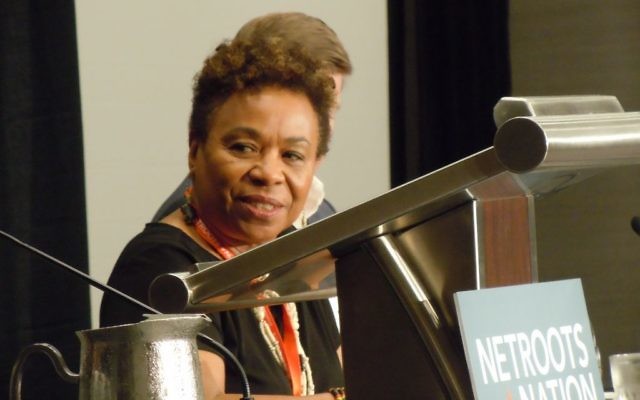Progressive Policy Hits Middle East Bump
A panel discussion at the Netroots Nation conference

The Netroots Nation panel almost made it to the end of the discussion on a progressive foreign policy without any trouble.
From the need to bring home the troops from Afghanistan to the bewilderment over President Donald Trump’s approach to North Korea, the 40 or so people in the meeting room at the Hyatt Regency downtown mostly nodded, clapped and occasionally snapped in support of the anti-militarist policies promoted by the four speakers Friday, Aug. 11.
Sure, former U.S. Senate candidate Charlie Hardy from Wyoming had an uncomfortable rant about how awful Venezuela was before Hugo Chavez, but that was easily glossed over by focusing on the United States staying out of the business of regime change.
Then, the final question of the morning, one squeezed in as the session ran over its allotted time at the national progressive conference, crossed the line.
“I would like to point out one elephant in the room that we have not talked about, and that’s Israel,” said a man who introduced himself as Mickey Reese, a student at the University of North Georgia. He complained about a double standard toward Israel, which is believed to have nuclear weapons, compared with Iran. “I don’t want Iran to have a nuclear weapon, but as long as we have this double standard, I think that we are going to be hated in the Middle East, and I wonder how we can break the hold that the Israeli lobby and other voices have on the U.S. Congress.”

Questions were taken in pairs, and the two U.S. House members on the panel, California Democrats Ro Khanna and Barbara Lee, answered the two parts of another question, regarding Twitter’s role in resisting President Donald Trump (Khanna represents Silicon Valley) and the psychological toll of growing up in a United States perpetually at war (Lee is a clinical social worker).
That left Israel to Stephen Miles, the director of Win Without War.
“We need to not have double standards in our foreign policy. We need to not be hypocritical with our values,” he said.

Without specifying the problem, Miles said the solution “is speaking up and demanding that our voices be heard.”
He cited as a prime example the enactment of the Iran nuclear deal two years ago over the opposition of AIPAC and $8 million in paid phone calls to Congress by an organization AIPAC created, Citizens for a Nuclear-Free Iran. He did not mention that J Street and many pro-Israel individuals lobbied for that deal.
“That is the challenge we should take from here today,” Miles said. “We can drown out the other side. We can have a progressive foreign policy, but only if we speak up and make our voices heard.”
The Palestinians were never mentioned during the 75-minute session.



comments